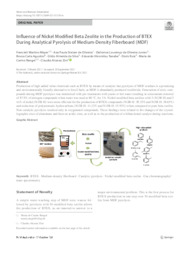Influence of nickel modified beta zeolite in the production of BTEX during analytical pyrolysis of medium-density fiberboard (MDF).
Influence of nickel modified beta zeolite in the production of BTEX during analytical pyrolysis of medium-density fiberboard (MDF).
Author(s): MAYER, F. M.; OLIVEIRA, A. P. de; OLIVEIRA JUNIOR, D. L. de; AGUSTINI, B. C.; SILVA, G. A. da; TANABE, E. H.; RUIZ, D.; RANGEL, M. do C.; ZINI, C. A.
Summary: Production of high added value chemicals such as BTEX by means of catalytic fast pyrolysis of MDF residues is a promising and environmentally friendly alternative to fossil fuels, as MDF is abundantly produced worldwide. Generation of toxic compounds during MDF pyrolyses was minimized with pre-treatments with yeasts or hot water resulting in a maximum removal of 87.9% of nitrogen compounds when water was used at 80 °C, for 3 h. Nickel-modified beta zeolites with 3 (Ni3B-H) and 5 wt% of nickel (Ni5B-H) were more efficient for the production of BTEX compounds (Ni3B-H: 39.35% and Ni5B-H: 38.65%) and reduction of polyaromatic hydrocarbons (Ni3B-H: 11.12% and Ni5B-H: 15.93%) when compared to pure beta zeolite. Non-catalytic pyrolysis resulted only in oxygenated compounds. These findings were related to the changes of the crystallographic sites of aluminum and then on acidic sites, as well as to the production of a bifunctional catalyst during reactions.
Publication year: 2021
Types of publication: Journal article
Unit: Embrapa Grape & Wine
Observation
Some of Embrapa's publications are published as ePub files. To read them, use or download one of the following free software options to your computer or mobile device. Android: Google Play Books; IOS: iBooks; Windows and Linux: Calibre.
Access other publications
Access the Agricultural Research Database (BDPA) to consult Embrapa's full library collection and records.
Visit Embrapa Bookstore to purchase books and other publications sold by Embrapa.

